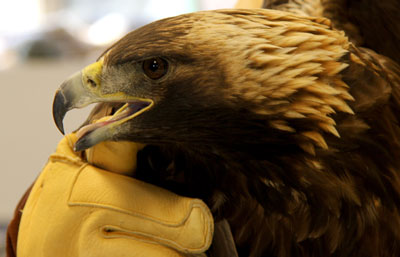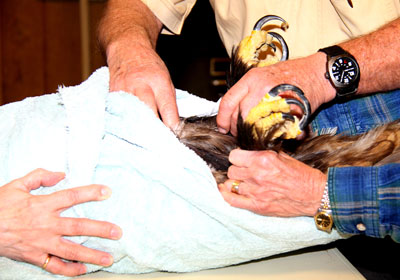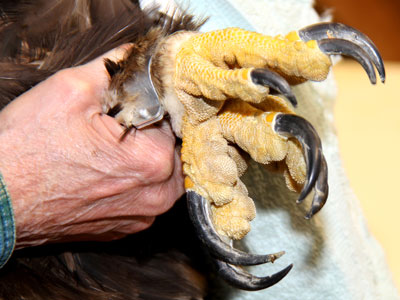When a golden eagle was brought to the Mid-South Raptor Rehabilitation Center with lead poisoning on Jan. 11, it never crossed Knox Martin's mind that it might be part of a broader problem.
But when a bald eagle showed up at the Center with the same ailment on Jan. 26, he began to wonder. Then when another golden eagle tested positive around Valentine's Day, he decided it might be time for a new policy.
All eagles brought to the center from now on will automatically be tested for lead poisoning - and the ones that test positive will be subjected to a rigorous treatment plan before they can be released.

"It seems to be a growing problem," said Martin, longtime director of the nonprofit facility located on the grounds of the Agricenter. "A lot of people assume when a bird has lead poisoning it's because it's been shot, but most of the time it's actually because they've ingested lead shotgun pellets by accident while eating prey. Even one pellet is enough to make a bird very sick."
Lead shot was outlawed for waterfowl hunting in 1991 in favor of biodegradable steel shot. But lead is still allowed for hunting several types of animals, including whitetail deer, mourning doves, bobwhite quail, wild turkeys, and small game like rabbits and squirrels. Stray lead also finds its way into the environment through competitive shooting sports and in the form of lead sinkers used by fishermen.
Nongame birds like eagles and hawks often ingest lead through consumption of dead or dying prey animals that contain spent lead shot - and the lead's effects can be devastating.
When contacted about the issue, Tom Mackenzie of the U.S. Fish and Wildlife Service referred to a report by the U.S. Geological Survey from late 2013.
According to the report, lead poisoning "causes behavioral, physiological, bio-chemical effects and often death" in warm-blooded animals. Martin said the treatment for the sickness is no fun either.
"We have to give them two injections a day for five days - one at 9 a.m. and one at 9 p.m. - and then take three days off," Martin said. "Then blood is drawn, and if their levels haven't gone down enough, the process has to be repeated."

The golden eagle brought to the center on Jan. 11 from Fort Pillow State Park in Lauderdale County, TN, was already near death and couldn't be saved. The bald eagle brought in from Reelfoot Lake on Jan. 26 was rehabilitated and released back into Lake County, TN.
The golden eagle that came to the center on Feb. 12 from northern Alabama was released Wednesday - and the bird, nicknamed "Jericho," obviously had places to be.
An electronic transmitter strapped to Jericho showed she spent her first night of freedom in Alabama. She then flew north to southern Kentucky by the end of the week and was located in southern West Virginia on Sunday afternoon.
"She had somewhere to be, and she wasn't going to miss out," Martin said, smiling. "We could have actually kept her a little longer to get the levels of lead in her blood a little lower. But they were acceptable, and we know she'd be wanting to head north to Canada for the mating season."
Martin said he'll start testing all eagles for lead poisoning when they're brought to the center to help them continue their amazing comeback.
After nearly disappearing from the United States during the 20th Century, bald eagles are now flourishing across the country to the point they no longer require the protection of the Endangered Species Act. Once a rare sight in the Mid-South, golden eagles are making a similar return.

"Since I started working with raptors in 1986, I had only seen three golden eagles - and the last one was 15 years ago," Martin said. "Now I've seen two brought in during the past few weeks. I'm also hearing from a lot of bird club people who are seeing them on a regular basis."
Scott Somershoe, an ornithologist for the Tennessee Wildlife Resources Agency, is part of the Eastern Golden Eagle Working Group - a group of conservation officials from several states studying eagles by trapping them and fitting them with tracking devices to monitor their movements.
Though he started trapping eagles solely in eastern Tennessee, he's expanded the project and now has several bait sites here in West Tennessee.
"Lots of goldens are being reported in West Tennessee," said Somershoe, while addressing the Tennessee Fish and Wildlife Commission last month. "We've actually had a couple of bait sites at the Hatchie National Wildlife Refuge (Whiteville) and we saw three golden eagles the first day we went there."
GOLDEN EAGLES ON THE MOVE
A golden eagle nicknamed "Jericho" was brought to the Mid-South Raptor Rehabilitation Center in Memphis on Feb. 12, suffering from lead poisoning. The large female bird was treated and released Wednesday afternoon back near its original home in northern Alabama. Through use of a radio transmitter, conservation officials have tracked the bird as it has flown across Tennessee to Southern Kentucky and on to West Virginia during the days since its release. You can follow the bird's continued travels online at:
TN Watchable Wildlife.